Accueil » Zoom sur le Collège » Zoom sur la Classe flash (6e et 5e) » Drama workshop in English – Ipécom Paris Lower Secondary School
Although the use of drama in the teaching of foreign languages dates back to the 19th century, very few schools have this subject on their syllabus as part of the pupils’ timetables. At a time when the emphasis is put on communication in a foreign language, theatre offers an original, efficient and rewarding strategy.
That has not escaped Ipécom Paris, a school that provides its pupils with a weekly drama workshop in English as an integral part of their lower secondary school studies. The workshop is managed by Rodolphe Fonty, MA ( Cantab) and a bilingual actor who works in close collaboration with Annie Reithmann, the head of the school.
An overview of the activities in the workshop
The range of the different formats of activities is wide from vocal and phonetic exercises to the performance of a whole scene. A drama game can be played in a few minutes during the first sessions, thus enabling the pupils to get a foretaste of what it is about. It is also an excellent ice-breaker for the more reserved teenagers. The drama approach can be either ‘closed’ (script-based) or ‘open’ ( creative language use) communication, depending on the teaching aims and learners’ needs.
Before putting on a scene or short play, many activities can be carried out. For instance the ‘one-word story’: students make a story as a group with each student saying one word in turn. It activates useful language for telling a story and can be great fun. The teacher puts to good use his knowledge of the great programmes of the Royal Shakespeare Company for schools. Moreover any type of actors’ rehearsal exercise can be adapted to a specific group. The various forms of drama are suitable for a focus on pronunciation, vocabulary, grammar and the introduction of new linguistic input. We also work with our bodies, and non-verbal communication exercises decrease learners’ anxiety or shyness.
And let us not forget that an actor ‘plays’ a role, so we devote a lot of time to character study and learn to step into someone else’s shoes. We enter the world of emotion and imagination, which, as we will see, facilitates memorization. The fun the pupils have means they come to this ‘class’ with eagerness -and ideas- while being fully aware of the precision and rigour that are required.
Finally an aim has to be set early on in the academic year: the presentation of a show to be performed before an audience. This audience- product-oriented approach (Fleming 2006) is the most motivating for learners, who like working towards a concrete end- product. It encourages them to want to do well and enhances the pleasure they derive from success.
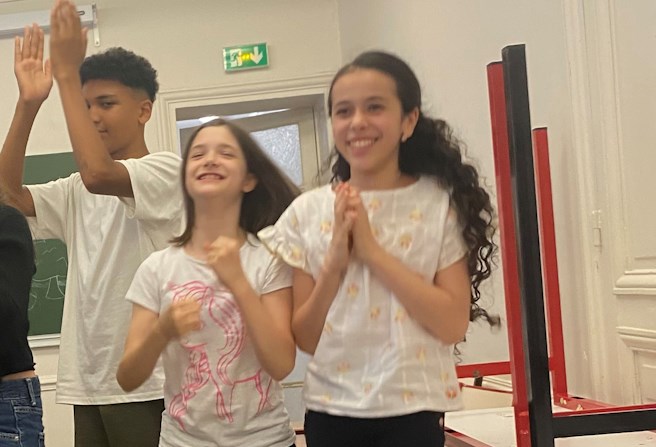
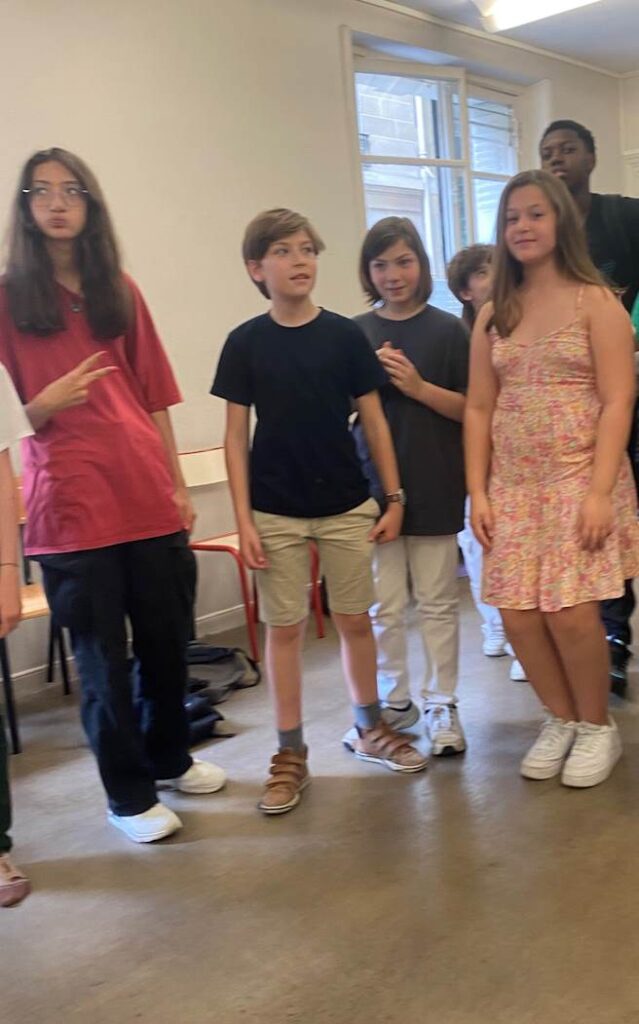
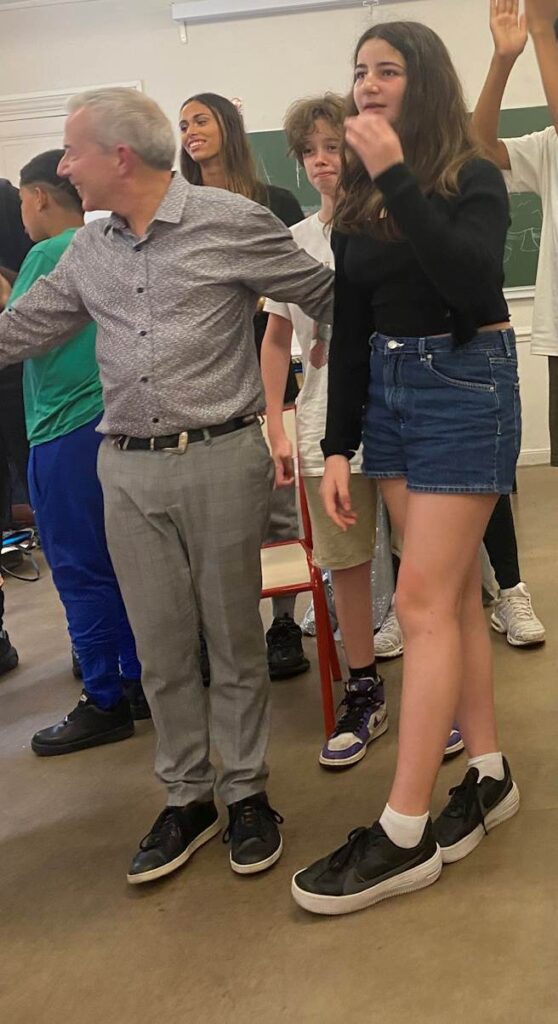
Students from Ipécom Paris in Drama Class
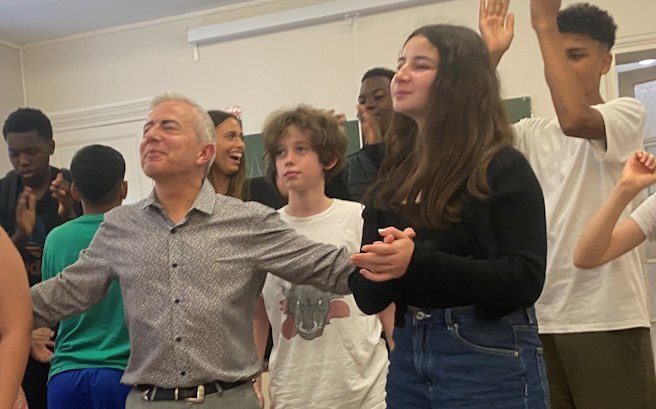
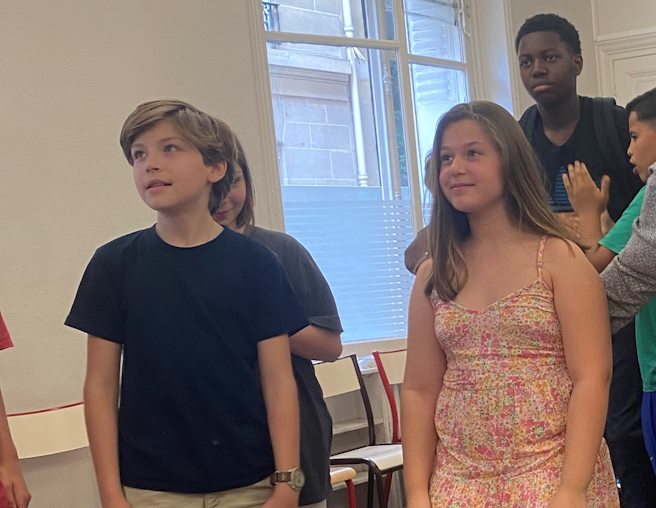
The benefits for language teaching
Many researchers have underlined the benefits of the use of drama for second language learning since the beginning of the 21st century. We are particularly interested in the articles written by Madonna Stinton and Kelly Freebody as they corroborate our own observations.
The first advantage comes from contextualising language. By letting learners experience the language in concrete situations, drama lends meaning to language structures and learners are able to memorize difficult phrases in context whereas they find it hard to learn vocabulary lists.
Drama activities also provide a safe environment : they practice difficult language and complex situations in the safety of the classroom. In addition the role of a fictional persona offers them a kind of protection and can be liberating. They seem to experience less unease when making mistakes.
The second asset of this approach is to be found in holistic learning. We appeal to the whole person when doing drama. The students’ physical, mental, social, intellectual, emotional, spiritual qualities are all called upon. Non-verbal aspects complement their verbal skills, and when we mark elements of language with emotion, learners will remember them. Communication becomes a global process involving body-language, intonation, pauses, stress, behaviour, rhythm on top of merely verbal skills.
We improve personal and social competences and therefore motivation is increased through this experience of collaboration, a sense of achievement and taking joy in a creative approach.
It is no wonder big international companies resort to actors in their seminars. Human Resources managers know well to what extent drama can boost communication and trigger articulate exchanges. Theatre makes us think and both teaches and entertains. As Ben Jonson put it, it ‘mixes profit with delight’. (Volpone 1606)
That is why Ipécom Paris, an international school, endorses and practises this approach, to the greatest advantage of their pupils.
Le Théâtre au collège Ipécom Paris

🎭 Atelier Théâtre en Anglais – Shakespeare en Scène au Collège Ipécom Paris (2025)

Remise de Prix du Concours de Poésie

Concours de Poésie 2024 : L'Art du Verbe et de la Performance

L’Éloquence du Cœur : Yannick Laurent Honoré comme Chevalier des Arts et Lettres

L'Enseignement et la Pratique du Théâtre

Innovation - Le Théâtre dans l'Éducation
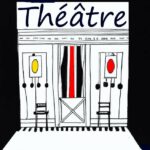
L'enseignement du théâtre

Drama workshop in English

L’atelier « théâtre en 🇬🇧 »
En savoir plus sur le collège Ipécom Paris
Mis à jour le 24 Mars 2025 à 17:14










